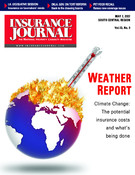The Coalition to Insure Against Terrorism (CIAT) and the American Insurance Association (AIA) jointly announced on April 24 that the two organizations have agreed on a set of common principles to be considered by Congress as it prepares to take up legislation that would renew the federal backstop for terrorism risk insurance.
Importantly, the CIAT/AIA joint principles call for the new legislation to be permanent, for the distinction between foreign and domestic acts of terrorism to be eliminated and to recognize the extreme nature of NBCR attacks through a lower deductible and certainty with respect to the role of private insurers in managing NBCR terrorism risk. These principles represent a set of parameters that should be considered as part of any Terrorism Risk Insurance Extension Act (TRIEA).
Both the AIA and CIAT also believe that consensus between two major stakeholders on this debate over how to structure renewal of TRIEA represents an important step forward which will hopefully inform the discussion among policymakers.
A critical issue that must be resolved by the new legislation is the separate treatment for nuclear, biological, chemical and radiological (NBCR) attacks which would recognize the unique characteristics of these events. Reports issued last year by the U.S. Government Accountability Office and the President’s Working Group on Financial Markets confirmed that the private market has not provided coverage for NBCR attacks outside of workers’ compensation lines. Insurers are required by state law to provide the coverage for workers’ compensation.
To address this issue, AIA and CIAT have agreed that the new legislation should contain a mandatory “make-available” provision that would require insurers to follow the standard workers’ compensation model. The organizations’ joint principles stress that the make-available provision must be accompanied by a clear acknowledgement that the federal government is responsible for NBCR terrorism losses above primary insurers’ individual NBCR retention levels. Additionally, TRIEA’s insurer co-pay requirement for NBCR would be eliminated.
Joint Recommended Principles 2007
The following list represents a set of common principles that CIAT and AIA believe must be addressed as Congress renews and improves the existing TRIA program. It is not intended to be an exclusive list of concerns or items that may be supported by individual companies or segments of the industries represented on this joint statement.
Goals:
- Promote long-term availability of terrorism risk insurance for policyholders and provide stability for financial markets and recovery after terrorist attacks.
- Spur greater capacity for those areas that are underserved even with the existing TRIA program, e.g., perceived high-risk areas and attacks utilizing NBCR.
Duration:
- The program should have no expiration date, and thereby end only when Congress determines terrorism is no longer a threat.
- Remove the distinction found in statute’s definition of “act of terrorism” that forces Treasury Secretary to make determination which may not serve national security needs.
Foreign vs. Domestic Acts:
Program Design: Two-part structure for financing both conventional terrorism risks and NBCR.
Conventional Terrorism Risks:
- TRIEA-like structure for conventional terrorism perils with continuation of (i) “make available” and (ii) retrospective policyholder surcharges. Continuation of current individual insurer retention at 20 percent of prior year direct earned premium and current individual insurer co-pay of 15 percent of every dollar of insured losses exceeding the retention up to the $100 billion annual cap.
NBCR:
- Reduce potential exposure and provide certainty with respect to the role of private insurers in managing NBCR terrorism risk by:
(1) Lowering or eliminating insurer deductible and eliminating the insurer copay for NBCR to reflect consistent view of GAO, Treasury, and PWG that
markets are not working in this area.
(2) Clearly and affirmatively stating that the federal government is solely liable for NBCR terrorism losses above insurers’ individual NBCR retentions, thus encouraging insurers to provide more capacity.
- So long as the private insurer role with respect to NBCR terrorism is consistent with the above-referenced principles, enhance “make available” provision to include availability to policyholders of an endorsement that provides coverage for NBCR terrorism that would otherwise be excluded by the nuclear hazard or pollution exclusion contained in certain commercial lines policies.
- Covered lines no narrower than those included in TRIEA program.
- Program trigger no higher than current $100 million, with possible special provision for small insurers.
Martin DePoy, is CIAT Steering Committee coordinator. CIAT represents a wide range of businesses and organizations throughout the transportation, real estate, manufacturing, construction, entertainment and retail sectors and speaks for business insurance policyholders. Marc Racicot is president of the Washington D.C-based American Insurance Association, a national, property/casualty insurance trade organization.
Was this article valuable?
Here are more articles you may enjoy.


 A 10-Year Wait for Autonomous Vehicles to Impact Insurers, Says Fitch
A 10-Year Wait for Autonomous Vehicles to Impact Insurers, Says Fitch  Nine-Month 2025 Results Show P/C Underwriting Gain Skyrocketed
Nine-Month 2025 Results Show P/C Underwriting Gain Skyrocketed  Portugal Deadly Floods Force Evacuations, Collapse Main Highway
Portugal Deadly Floods Force Evacuations, Collapse Main Highway  AIG’s Zaffino: Outcomes From AI Use Went From ‘Aspirational’ to ‘Beyond Expectations’
AIG’s Zaffino: Outcomes From AI Use Went From ‘Aspirational’ to ‘Beyond Expectations’ 


